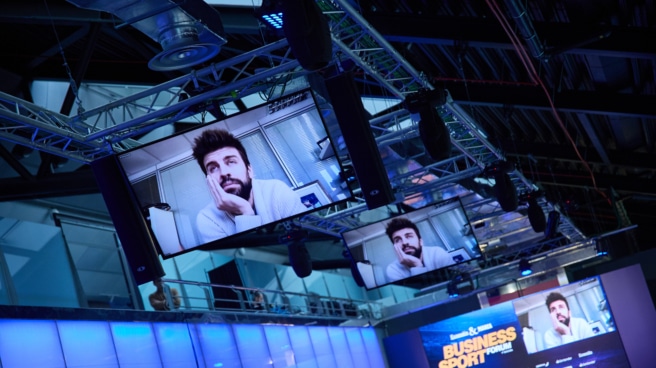

Marca newspaper deputy director Carlos Carpio during a telematic interview with former football player Gerrard Pique during the Business Sports Forum.
Former FC Barcelona football player Gerard Pique was interviewed as part of the Business Sports Forum, organized by Brand And Extension in which he analyzed the situation of football giants such as Real Madrid and Barcelona, which are threatened by huge fortunes supported by other sports projects.
Pique believes that under the current football model, Barcelona and Real Madrid are “on track to not be able to compete in Europe in the top five” due to the lack of uniformity of financial rules between the different domestic leagues, as well as the lack of uniformity of financial rules between different national leagues. because Barcelona and Merengues are “getting into debt.”
“It can’t be that there are 70-80 games a year, people don’t even know what’s going on anymore, there are a thousand competitions that people miss. And football players get much more injured. less games and more bonusto consume higher quality football,” Pique said at the Business Sports Forum organized by Marca y Expansión.
The 2010 world champion with Spain believes that the solution is not the European Super League, proposed by Real Madrid president Florentino Perez, because for him “it is a closed championship and I am against it. Many are going “If you are left out and its value becomes zero, you will lose followers. National leagues will no longer exist and Super League teams will grow,” he explained.
“An important part of football, as we understand it, will be destroyed. If you shorten the calendar, you will continue to compete and athletic performance depends on it, you will not suddenly stop progressing. Sporting merits must prevail and that is why I am against the Super League” argument.
Pique insisted that current football needs “changes” but he doesn’t know if they will be “radical” and “short-term” or “more changes that are worth trying to continue.” “Barça and Real Madrid, who have already demonstrated this and expressed it actively and passively, are trying with the Super League to at least make people aware of it and the big federations like UEFA and FIFA to understand that they cannot do it” . continue this line,” he supported.
“Others in Europe who were pushing the Super League movement at the time then backed off simply because in England the whole country mobilized because they love the Premier League. They didn’t want this to happen, they got scared and retreated, but all of them “biggest countries” in Europe want to be able to do something like this. This is obvious,” he assured with conviction.
And Piquet focused on the heterogeneity of economic control in different European national leagues. “La Liga has a very strict financial fair play, but in other leagues it is completely different. Then you have the European competition where you compete against all these teams that are not regulated. Because they talk about financial issues.” Fair Play,” but then they look the other way because it interests them on a political level,” he commented.
“Because there is no strict regulation, you may find clubs whose countries are increasingly increasing your salaries and using other means that can pay players without the club paying them. Thus, Barça and Madrid will not be able to compete. “I don’t want to be pessimistic and I hope the situation will change, but we are on a path where in five years Barça and Madrid will not be able to compete in Europe,” he added.
In addition, he criticized the economic distribution of television rights in La Liga. “Two billion euros have been received, which are distributed between the teams, and there are clubs for which, because of the audience, there is no point in receiving this money. This is injustice, I understand perfectly well that Barça or Madrid are coming. and they will raise their hand and say, “I don’t think so.” Well, because there are a lot of teams that live off us,” he said.
Finally, he stated that “it is impossible to spend 90 minutes locked in a room watching only a football match” because consumer habits have changed. “This doesn’t make any sense. Kids today don’t do that anymore, and neither do I. It’s a different way of consumption. I think sports, especially football, must adapt to this,” he concluded.
Source: El Independiente